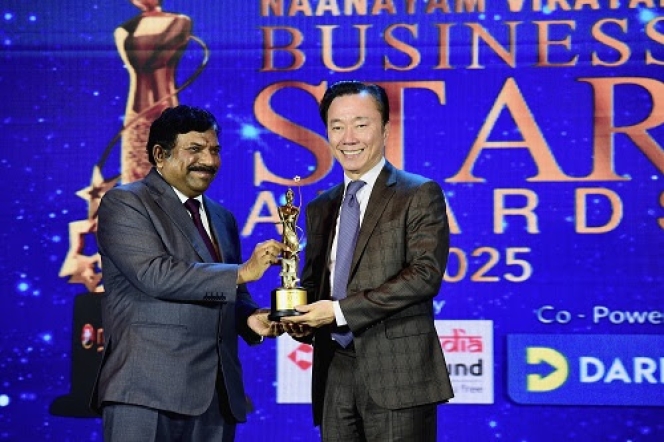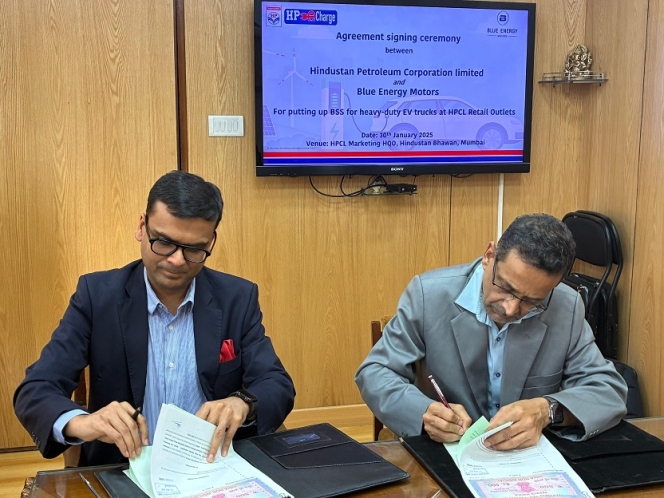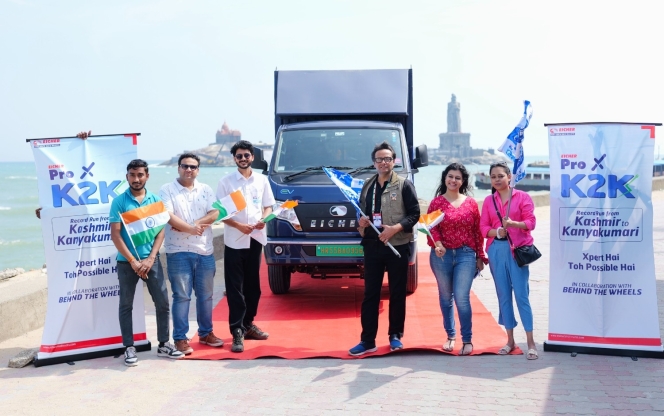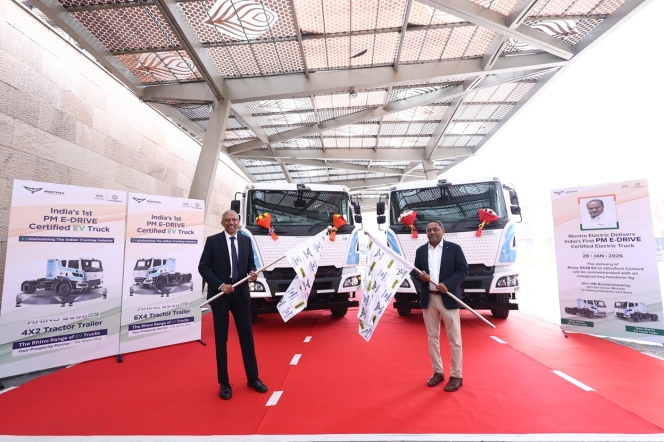- HD Kumaraswamy
- PM E-DRIVE Scheme
- Charging Infrastructure
- EV Adoption
- Electric Vehicles
- E-Vouchers
- FAME-II Scheme
India To Ensure Sufficient Charging Infrastructure For Massive EV Adoption, Says HD Kumaraswamy
- By MT Bureau
- September 18, 2024

HD Kumaraswamy, Union Minister for Heavy Industries and Steel, Government of India, today said at a seminar that India will ensure sufficient charging infrastructure to support the massive adoption of electric vehicles across the country.
Speaking at the seminar hosted by FICCI and Ministry of Heavy Industries on 'FAME's Success in Transforming India's EV Landscape', Kumaraswamy also talked about introducing e-vouchers for electric vehicle (EV) buyers to avail of demand incentives under the newly approved PM E-DRIVE (PM Electric Drive Revolution in Innovative Vehicle Enhancement) scheme. "This is a unique new feature of this new scheme. The modalities of this are in an advanced stage and will be shared with you soon," explained Kumaraswamy, further adding that the govt’s goal is to reduce the nation’s environmental footprint, improve air quality and build a competitive and resilient electric vehicle manufacturing industry.
The Union Cabinet introduced the PM E-DRIVE scheme last week with the goal of accelerating the adoption of electric vehicles (EVs) by providing significant upfront incentives and developing essential infrastructure for charging them. The new plan adds a number of new components, such as INR 5 billion set aside specifically for the deployment of e-ambulances, INR 5 billion to encourage the use of electric trucks and INR 20 billion for the installation of 22,000 fast chargers for electric four-wheelers, 1,800 for e-buses and 48,400 for e-two and three-wheelers.
According to Kumaraswamy, 92 percent of the INR 115 billion allotted has been used to encourage around 93 percent of the targeted vehicles. Significant progress has also been made in public transit under the project; as of 31 July 2024, a total of 4,853 e-buses have been supplied out of the 6,862 authorised for intra-city operations.
Vinod Aggarwal, Immediate Past President, SIAM and MD & CEO, VE Commercial Vehicles, highlighted the FAME-II scheme's noteworthy contribution to the growth of India's e-mobility industry. Over 5 percent of the market for two-wheelers, 54 percent of the market for three-wheelers and 1.5 percent of the market for cars has been penetrated by the scheme. Aggarwal pointed out that, in comparison to the prior year, passenger EV sales increased by more than 90 percent and electric two-wheeler sales increased by more than 30 percent in 2023–24, demonstrating the scheme's success in hastening EV adoption throughout India.
Kamran Rizvi, Secretary, Union Ministry of Heavy Industries, said, “With the PM E-DRIVE coming, the Phased Manufacturing Programme, the domestic value addition targets will be tweaked and amended so as to take advantage of our increased capability, and so that we become a truly a world leader in electric mobility technology.
Underlining the FAME II scheme as among the most transformative policies in India and noting that the electric three-wheeler industry was almost zero three years ago, FICCI President and Group CEO & MD, Mahindra Group, Dr Anish Shah, said, “Now, the industry has gone from zero to 20 percent, and we expect this to reach 100 percent in the next five years.”
Stressing the need for innovation, R&D and technology enhancements to maintain global competitiveness, Vikrampati Singhania, Vice President, ACMA and MD & Director, J K Fenner India, said, "The EV and autonomous vehicle market demands precision and advanced components. Investing in R&D, localisation and collaborations with startups and tech leaders will keep our industry at the forefront.”
- VinFast
- Investor of the Year
- Urban Electric Vehicle of the Year
- VinFast VF 7
- Motor Vikatan Awards 2026
VinFast Wins Dual Honours In India For Investment And Electric SUV
- By MT Bureau
- January 31, 2026

VinFast’s strategic progress in India has been further validated through recent accolades from the influential Vikatan Group media network. The company was distinguished with two significant awards: one recognising its substantial investment commitment, and the other honouring its VF 7 model as the premier urban electric vehicle for 2026. These commendations underscore the brand’s deepening integration into the Indian automotive sector, highlighting both its industrial strategy and its product relevance.
The title of Investor of the Year, conferred by Nanayam Vikatan business magazine, specifically acknowledges VinFast’s landmark commitment to establishing an electric vehicle manufacturing facility in Thoothukudi, Tamil Nadu. This project is noted not only for its scale and strategic clarity but also for its anticipated role in fostering a new industrial corridor, generating employment and bolstering the local supplier network. It aligns with national initiatives like Make in India and reflects confidence in the region’s manufacturing potential.
Concurrently, the VF 7 electric SUV was named Urban Electric Vehicle of the Year at the Motor Vikatan Awards 2026. This recognition from automotive experts underscores the model’s successful adaptation to India’s urban driving conditions, balancing design, performance, safety and comfort. It serves as a testament to VinFast’s product development focus and its localisation strategy aimed at meeting specific market demands.
As a respected media institution in South India with a legacy dating to 1926, the Vikatan Group’s awards carry considerable weight among businesses and consumers. These latest honours add to a growing list of VinFast’s achievements in the market, illustrating the convergence of its investment, manufacturing, and product efforts. Within a short timeframe, the company has employed a long-term strategy encompassing manufacturing, retail, charging infrastructure and after-sales services. Through this comprehensive approach and a focus on sustainable innovation, VinFast is steadily building its brand presence while contributing to India’s transition towards green mobility.
Pham Sanh Chau, CEO, VinFast Asia, said, “Being recognised in two important award categories demonstrates how VinFast is steadily building its position in India, not only through long term investment commitments but also through products developed to match local conditions and user needs. This recognition provides further momentum for us to accelerate implementation, expand the electric vehicle ecosystem, and maintain a long-term partnership with the Indian market.”
B Srinivasan, CEO, Vikatan Group, said, “VinFast India represents the new-age investor – bold in vision, swift in execution and deeply aligned with India’s growth story. By unravelling the true potential of the port city of Thoothukudi, VinFast India has helped create a conducive industrial ecosystem, played a positive role in employment generation and restored the city’s importance on India’s manufacturing map. Their investment is not just capital at work but confidence in India’s future.”
Blue Energy Motors And HPCL Forge Nationwide Pact For Electric Truck Battery Swapping
- By MT Bureau
- January 30, 2026

Blue Energy Motors and Hindustan Petroleum Corporation Limited (HPCL) have entered a strategic partnership to deploy Battery Swapping Stations for electric commercial trucks at select HPCL fuel outlets nationwide. This initiative leverages HPCL’s extensive network of over 24,400 retail locations to create a widespread and convenient energy infrastructure for freight operators. By situating swap stations within established fuelling hubs, the collaboration seeks to make electric mobility a practical and scalable reality for India’s logistics sector.
The core advantage of battery swapping lies in its dramatic reduction of energy replenishment time to under five minutes, minimising vehicle downtime compared to conventional charging. For fleet operators, this efficiency translates into higher vehicle utilisation, improved productivity and more predictable scheduling. Furthermore, a growing and accessible network of swap stations alleviates range anxiety, enabling electric heavy-duty trucks to confidently undertake longer routes and multiple shifts.
As India advances its green transportation goals, this alliance holds significant strategic value. HPCL’s vast retail footprint, which already supports over 5,400 EV charging points under its HP e-Charge brand, offers a ready platform for rapid infrastructure deployment across key freight corridors. Blue Energy Motors, a pioneer in zero-emission freight solutions, brings its expertise in electric commercial vehicles, exemplified by its launch of India’s first electric freight corridor. Together, the companies aim to accelerate electric vehicle adoption by directly addressing the operational needs of commercial fleets, thereby strengthening the long-term development of sustainable freight transport in the country.
- Eicher Trucks and Buses
- VE Commercial Vehicles
- VECV
- India Book of Records
- IBR
- Eicher Pro X
- Vinod Aggarwal
- SS Gill
- Abhishek Chaudhary
Eicher Pro X EV Completes Kashmir To Kanyakumari Journey In 6 Days
- By MT Bureau
- January 28, 2026

Eicher Trucks and Buses, part of VE Commercial Vehicles (VECV), has completed a journey from Kashmir to Kanyakumari using its Eicher Pro X EV.
The record verified by the India Book of Records (IBR), saw the electric vehicle cover over 4,000 kilometres in 6 days under loaded conditions. The run commenced in Srinagar on 20 January 2026 and concluded in Kanyakumari on 26 January 2026, traversing the Himalayas, plains and the Deccan Plateau.
Throughout the expedition, the vehicle utilised public chargers located via the MyEicher App. An adjudicator from the India Book of Records accompanied the truck to monitor route compliance, load, distance and charging stops. The mission served as a demonstration of electric vehicle endurance across diverse altitudes and climates to validate the technology for logistics corridors.
The journey was intended to show that electric commercial vehicles can operate beyond short-haul deliveries. By maintaining performance across hilly and coastal routes, the Pro X EV aimed to establish total cost of ownership (TCO) benefits and maintenance predictability for fleet operators. The successful completion of the route suggests that current charging infrastructure can support long-haul electric freight movement.
Vinod Aggarwal, MD & CEO, VE Commercial Vehicles, said, “For more than four decades, Eicher trucks and Buses have earned customer trust through leadership in fuel efficiency and application-specific engineering. The record-setting performance of the Eicher Pro X reinforces our unwavering focus on application excellence, reliability, and performance, anchored in robust product development and manufacturing capabilities, and enabled by a customer-centric, pan-India commercial and dealer network. I commend the entire Eicher team for achieving these well-deserved records”.
SS Gill, Chief Commercial Officer, VE Commercial Vehicles, said, “By covering the K2K route with a loaded Pro X EV, Eicher Trucks & Buses has proven that electric mobility is no longer restricted to short-haul, ‘last-mile’ deliveries. We are not just setting records, but through the strength of our service network and extensive dealer set-up, we are demonstrating that our EV technology is commercially viable, reliable, and has the range to serve as the backbone of India’s green logistics corridors”.
Abhishek Chaudhary, SVP – SCV Sales & Marketing, VE Commercial Vehicles, said, “The Eicher Pro X EV was put to the ultimate test – covering over 4000 kilometres across diverse climates and challenging altitudes. With this recognition from the India Book of Records we’ve moved beyond our own stringent testing benchmarks to real-world validation - Demonstrating that Eicher Pro X EV is a dependable partner for logistics movement across varied operations in India”.
- Montra Electric
- Murugappa Group
- PM E-Drive Scheme
- Rhino 5538 EV 6x4 Tractor trailer
- Narendra Modi
- H D Kumaraswamy
- Arun Murguappan
- Sathia Raj
- UltraTech Cement
Montra Electric Becomes First OEM To Receive PM E-Drive Certification For Heavy Trucks
- By MT Bureau
- January 28, 2026

Montra Electric, the electric medium and heavy commercial vehicle business of the Murugappa Group, has become the first manufacturer in India to receive certification for heavy-duty electric trucks under the government's PM E-Drive Scheme.
To mark the achievement, the company delivered a Rhino 5538 EV 6x4 Tractor trailer to UltraTech Cement. The handover took place in the presence of Arun Murugappan, Chairman of Montra Electric and Sathia Raj, Chief Procurement Officer of UltraTech Cement.
The PM E-Drive scheme includes a budget of INR 5 billion specifically for electric trucks, providing a benefit of up to INR 960,000 per vehicle for the Rhino 5538 EV. This incentive is intended to lower operating costs and reduce exposure to fuel price volatility for fleet operators in the logistics, mining, and manufacturing sectors. The Rhino 5538 EV range is designed for Indian conditions and is available in 6x4 and 4x2 variants.
The Rhino 5538 EV 4x2 variant features a 282 kWh LFP battery that produces 380 HP and 2000 Nm of torque. It offers a range of approximately 198 km under standard test conditions and supports six-minute battery swaps. These specifications suit the vehicle for high-utilisation applications in ports, steel plants, and cement logistics.
H D Kumaraswamy, Union Minister for Heavy Industries, said, "The PM E-Drive scheme is a testament to the growing prowess of Indian innovation in the heavy-duty electric vehicle segment. Under the visionary leadership of Prime Minister Narendra Modi, we are committed to decarbonizing our logistics and making India a global hub for EV manufacturing. Electric trucks are pivotal to our Net Zero goals, and by fostering a self-reliant ecosystem through such certifications, we are driving the spirit of Atmanirbhar Viksit Bharat. We are very happy to see our Prime Minister’s vision coming to life with the 1st PM E-Drive certified heavy duty electric truck from 'Montra Electric' getting delivered today."
Arun Murugappan, Chairman, Montra Electric, said: “Decarbonising freight is one of the most critical challenges in India’s energy transition. We are grateful to the Government of India and our Prime Minister Narendra Modi for introducing forward-looking and progressive policy frameworks such as the PM E-Drive Scheme, which represent a welcome and transformative step in accelerating this shift, particularly in heavy commercial vehicles where emissions intensity is high. At Montra Electric, we are proud to contribute to this national mission by delivering technologically advanced, reliable, and scalable electric M&HCV solutions that can drive meaningful and lasting change in India’s mobility ecosystem.”








Comments (0)
ADD COMMENT